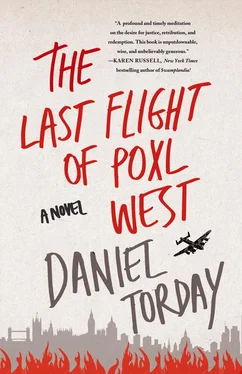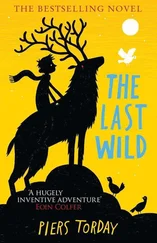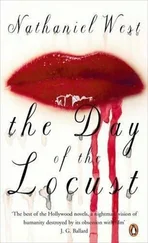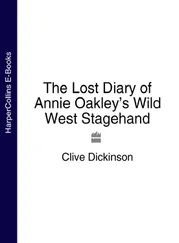Not only did he charge over to pick up the contents of my trunk but he still had done nothing to cover himself. His paint-splattered canvas pants still sat in the corner opposite. In charging over in so disrobed a state, and rapidly going flaccid, he also pronounced quite explicitly that he was not a Jew himself — as evinced by a rather ugly piece of pachyderm skin, which proved that, unlike Abram five thousand years earlier, he’d not made the essential covenant with the Lord that my people had made with every male birth since.
I had to put up a hand to stop him from taking another step.
He stopped.
All this time my mother continued to stand in a corner. I latched the trunk and collected my rucksack and was out of the house and down the hill to the Leitmeritz station without having said a proper good-bye to my mother or my father. The smell of the river lodged in my nose and piggybacked along with it was the image of that cuckolding suitor of my mother’s, and a heat rose up into my cheeks I couldn’t cool.
I got on the next train south.
As I left the house that day I expected anger — but marrow-deep anger follows action after a lag of days, not hours. The sulfurous river smell returned to my nose as I descended the hill toward its source from our house, and before me was the memory that longed to gain purchase:
I was too young even to know how young I was, before my father ever took me up in his plane. My cousins and I had just returned from an afternoon sunning along the Elbe, one town over, in Schalholstice. This is where our fathers’ leather was tanned, where the current was strongest and could lend the most power to the mill wheel. My father would select the hides of cows in Prague, in Brno, in Budapest, or travel to the port in Rotterdam, and the raw hides would then be dipped into these huge oak barrels dug into the ground and covered over with straw. From there they would be taken to the factory for finishing, packaging, and shipping.
We reached those huge circular vats dug deep into the muddy soil alongside the river, where the mill wheel of Brüder Weisberg turned day and night. And there between sunken vats my mother was holding my father’s hand. They were only bodies against the backdrop of leather tanning vats, looming above holes in the brown ground. My father stood stiff. His shoulders were held perfectly parallel to the ground. None of the ease I’d witnessed in watching my father full of life before flying his plane was evident. He looked stiff — and uncomfortable. My mother tugged his sleeve toward her, French cuffs I knew so well pinned together with links adorned with Czech amber, the liquid solidified millions of years long since passed. My father did not move. My mother pulled herself by his sleeve, pushing her chest against his arm. She was flirting, but he was not flirting back. Even as young as we were then we could see it. They were standing only a few feet in front of the nearest vat to one side, closer even on the other.
Still my father did not move.
Only now, as my mother went around him, she lost her footing. Her foot dunked straight through the straw into one of the vats. She and my father both looked down at it. My cousins and I were too far to smell it, but we saw the way my father’s shoulders dipped perpendicular to the horizon as he lifted my mother from the ground, expertly held her in his arms, and ran her to the river to soak her in its waters. I recognize now the opportunity that had passed — that my father never had a chance to loosen up, to give my mother the love she wanted. But I suppose it’s too hopeful to imagine he would have changed. Who could say how many more times this scene had played out, or one like it, my mother needing something my father couldn’t, or wouldn’t, give. But I didn’t see all that then. What I saw was my father acting when action was needed, carrying my mother riverward. The last thing any of us saw — Was I the only one to see it? Did Niny and Johana see it as well? Or was it so dark none of us could see it, and I’ve only invented it in my memory over the years? — was the look on my mother’s face: the relaxed eyes, the taut, smiling lips of a woman who has achieved happiness so momentary it is a flash more fleeting than the look captured in a painting.
My cousins and I did not say a word to one another. We walked back down to another part of the river to swim.
4.
In Prague I was forced to wait for the evening train. When night came, we rode out of Hlavni Nadrazni. Lights scattered across the Zizkov hills like trails of a thousand small fires burning. Holland lay before me, five hundred miles west. I closed my eyes, and when I opened them again the Vlatava flowed dark alongside my window. In the distance, the peaks of St. Vitus Cathedral pronounced themselves against the night sky. The church was lit from below as if to say good-bye to her departing Semitic son. A flock of waterbirds lifted off the dark water in unison. The moon lit the river not yet signifying a bombing, but only Czechoslovakian night.
I arrived in Rotterdam two days later and was let off at the station not far from the harbor. My mouth was full of a long night’s cigarette smoke, my head not a fit for my brain. Already I’d fared poorly — the bag our housekeeper had packed was lost on the train. I only had money enough for a couple nights’ sleep in a hotel until I could find work. Once I was settled I would seek out whatever business connections my father had set up for me there. First thing, I found a room above a small restaurant called Café le Monde on Schiedamsedijk, and at the café a job bussing tables.
The first night there was a Saturday, and as the dinner crowd thinned, a group of musicians filed in with their large black cardboard instrument cases. They set up outside, and inside the café I could feel only the thud of the double bass. Toward the end of their set I went out front. They were a quartet, a pair called the Tennessee Sisters, backed by two men, and they played a kind of music I’d never heard before. That bass and a banjo backed up two young women, who sang high harmonies.
The lead singer was called Maybelle Tennessee. Her face was the color of untreated pine, dusted with ground cardamom. Her dark hair wasn’t quite black and was kinky as if even the ends of her hair longed to stay as close as they could to her head. There was a gap between her two front teeth wide enough to slip in a chapbook of love songs, and in this slight imperfection she was only more alluring. Next to her ear, a brown-pink scar drew bright against her earthen skin before she sang. I stood there and watched. Here I was, alone in the world, listening to two Dutch girls sing American folk songs.
After their set, I cleaned the tables out front, where people had sat to listen to them.
“Do you have a deep, enduring love for the American folksinger Bill Monroe?” Maybelle said to me. She said it in English, of which I knew only a little.
“Am not a waiter,” I said, using the tiny bit of English I had learned from my grandmother’s American cousin. “I find one.”
“I do not want a waiter,” she said. She spoke to me in German now, having picked up on my accent. “I saw you listening to us. From looking at you I thought you were an American and perhaps a fan of brother-duo singing music. But you are not.”
“I am not,” I said.
“You should know!” she said. “He is the greatest American folksinger of all American folksingers. Bill Monroe, one of the brothers in the Monroe Brothers, along with his brother Charlie Monroe. They are the finest of all brother-duet singers in America, the Monroe Brothers.”
“I don’t know their music,” I said. And with a boldness I would never have had back in Leitmeritz, a young man on his own in a new life, prepared not to repeat the mistakes he’d witnessed in his father’s reticence, I said, “But I’d like to hear more of it.”
Читать дальше












